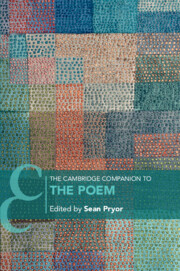Book contents
- The Cambridge Companion to the Poem
- The Cambridge Companion to the Poem
- Copyright page
- Contents
- Figures
- Contributors
- Acknowledgments
- Chronology
- Introduction
- Part I Ideas of the Poem
- 1 Singularity
- 2 Genre
- 3 Poem/Song
- 4 Poem/Novel
- 5 Poem/Concept
- 6 The Poem in Translation
- Part II Forms of the Poem
- Part III The Poem in the World
- Further Reading
- Index
- Cambridge Companions To …
1 - Singularity
from Part I - Ideas of the Poem
Published online by Cambridge University Press: 30 May 2024
- The Cambridge Companion to the Poem
- The Cambridge Companion to the Poem
- Copyright page
- Contents
- Figures
- Contributors
- Acknowledgments
- Chronology
- Introduction
- Part I Ideas of the Poem
- 1 Singularity
- 2 Genre
- 3 Poem/Song
- 4 Poem/Novel
- 5 Poem/Concept
- 6 The Poem in Translation
- Part II Forms of the Poem
- Part III The Poem in the World
- Further Reading
- Index
- Cambridge Companions To …
Summary
This chapter argues that the concept of singularity is particularly helpful in examining what is distinctive about the reader's or listener's experience of a poem of literary quality. The chapter compares singularity to comparable concepts, such as difference, uniqueness, and originality, and it argues that singularity has two especially important features: a relation to generality and a relation to the event. This means that singularity is something that happens, something that the reader or listener experiences, rather than an unchanging object independent of readers and listeners. As something that happens, the singularity of a poem may work with, as well as against, conventions shared by other poems. Treating examples by Andrew Marvell, Christina Rossetti, and others, the chapter concludes that a singular poem is singular precisely through its arrangement of poetic conventions, shared social discourses, and general linguistic codes.
- Type
- Chapter
- Information
- The Cambridge Companion to the Poem , pp. 19 - 33Publisher: Cambridge University PressPrint publication year: 2024

